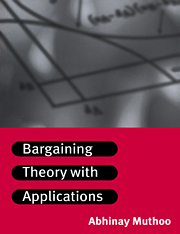1 - Preliminaries
Published online by Cambridge University Press: 24 November 2009
Summary
Bargaining Situations and Bargaining
Consider the following situation. Individual S owns a house that she values at £50,000 (which is the minimum price at which she would sell it). Individual B values this house at £70,000 (which is the maximum price at which she would buy it). If trade occurs — that is, if individual S sells the house to individual B — at a price that lies between £50,000 and £70,000, then both the seller (individual S) and the buyer (individual B) would become better off. This means that in this situation the two individuals have a common interest to trade. But, at the same time, they have conflicting interests over the price at which to trade: the seller would like to trade at a high price, while the buyer would like to trade at a low price. Any exchange situation, such as the one just described, in which a pair of individuals (or, organizations) can engage in mutually beneficial trade but have conflicting interests over the terms of trade is a bargaining situation.
Stated in general and broad terms, a bargaining situation is a situation in which two players have a common interest to co-operate, but have conflicting interests over exactly how to co-operate. To put it differently, the players can mutually benefit from reaching agreement on an outcome from a set of possible outcomes (that contains two or more elements), but have conflicting interests over the set of outcomes.
- Type
- Chapter
- Information
- Bargaining Theory with Applications , pp. 1 - 8Publisher: Cambridge University PressPrint publication year: 1999
- 1
- Cited by



